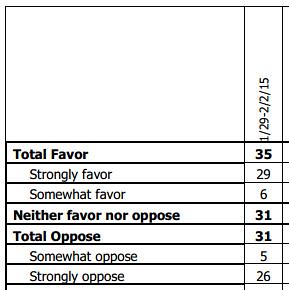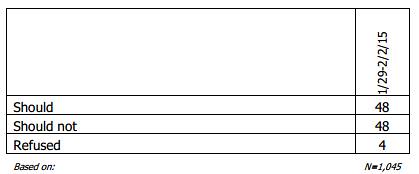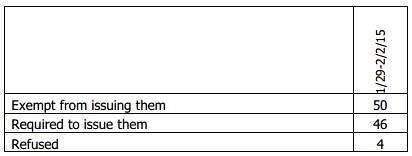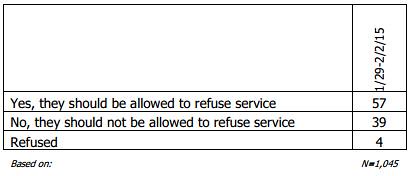We posted a wire story about this poll on the homepage yesterday, but I think it merits a second look because its results help illustrate an interesting trend in public opinion. The national Associated Press survey asked American adults a series of questions about same-sex marriage and conflicting rights, starting with the basic, "do/would you favor, oppose, or neither favor nor oppose a law allowing same-sex couples to be legally married in your state?" Results:

Here, slightly more Americans support legalized gay marriage in their state than opposite, but just as as many -- almost one-third of respondents -- don't care enough to come down on either side. That's an awful lot of ambivalence about a "hot button" topic. When the pollster prods the "meh" crowd further, the numbers end up at (44/15/39) for support, no opinion, and oppose, respectively. This isn't an overwhelming or surprising result; public backing of same-sex marriage began to outpace disapproval for the first time just a few years ago. Americans split evenly on whether the Supreme Court should intervene and settle this social question nationally by ruling that laws banning gay marriage are unconstitutional:

The High Court will decide such a case this spring, as the legal world holds its collective breath. Up next comes a pair of questions about the rights of SSM dissenters. First, "in states where same-sex couples can be married legally, do you think that state and local officials and judges who issue marriage licenses but have religious objections to same-sex marriage should be required to issue marriage licenses to same-sex couples, or should they be exempt from issuing them?"

A narrow majority believes that local officials who object to SSM on religious grounds should be granted exemptions from issuing marriage licenses to gay couples, even in jurisdictions where those unions are legally permitted. A noticeably larger majority thinks that private businesses shouldn't be forced to participate in gay wedding celebrations, rejecting the stance adopted by a number of courts and "human rights commissions:"

So Americans favor a licence-issuing exemption by just four points, but an exemption for businesses by nearly 20. What gives? I suspect people are more inclined to say that government officials should be required to carry out the law, whereas private citizens in the marketplace ought to be granted more leeway. On the latter issue, when Rasmussen framed a similar poll question in 2013 as an issue of "deeply held religious beliefs" and the "right to say no," fully 85 percent of respondents agreed that business owners like photographers should be allowed to opt out of offering their services at same-sex weddings. Bottom line: While more and more Americans are warming to the idea of legalized gay marriage, most believe that tolerance and respect for differences should work both ways. (In fact, I'd bet that poll questions that employ the term "opt out" would be more likely to yield favorable small-L liberal results than those that discuss refusal of service*). Sadly, after earnestly winning hearts and minds with compelling "live and let live" appeals, some gay rights activists have set their sights on the very different goal of enforced celebration, and appear willing to purge dissenters whenever possible. I've argued previously that the former shift in public opinion is healthy and welcome, whereas the latter tactical adjustment is terribly pernicious for our society. Incidentally, I'd be very curious to see the demographic breakdown on that last question. Are young people -- who overwhelmingly support gay marriage -- less likely than other age cohorts to tolerate disagreement by respecting the right of dissenting fellow citizens to live their lives according to their beliefs?
*I recognize that public accommodation and non-discrimination laws are a complicating factor in this debate, and shouldn't be disregarded. I believe that the free exercise clause of the First Amendment should trump most other considerations on this front, particularly as it pertains to active participation in a ceremony that consecrates and codifies same-sex relationships. Surely there is some meaningful difference between, say, a restaurant refusing to serve a gay couple, and a caterer declining to work that same couple's wedding.
UPDATE - In other religious liberty news, a US appeals court just fortified a recent Supreme Court precedent (established in a 9-0 decision) regarding the "ministerial exception" to various anti-discrimination laws. When one factors in last year's Hobby Lobby ruling, religious freedom is still hanging in there.
